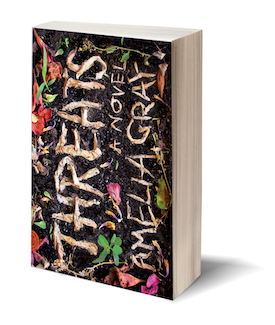ThreatsBy Amelia Gray
FSG Originals |
 |
|---|
At various points over the course of dental history around the world, different cultures were convinced that cavities were caused by worms. There were enough worms manifest in the rest of the body that it seemed possible for very small worms to coil inside a tooth or between two teeth, spreading decay and ruin. The Sumerians believed in the worms as early as 5000 B.C., the Muslims determined that the theory was garbage in A.D. 1200, and the French figured it out about fi ve hundred years later, using microscopes. But there were bright sides to the error, and one of the brightest sides was the glut of beautiful worm- related art that came out of all cultures. One French carving featured a molar, done in ivory, the size of a human tooth. This ivory tooth could be opened to reveal a carved dual scene of the worm itself imagined as a demon in Hell, devouring the impious whole—screaming, pathetic individuals thrown into one of Hell's general fires, perhaps in preparation for the tooth worm or as an alternative fate.
In hindsight, the tooth worm might have done its part to contribute to the ruin of David's dental career. He first saw the French carving in school, and subsequently, whenever he looked into a mouth, he imagined the coiled serpents. He saw them in the deeply troubled molar profiles of his squirming patients at the free clinic, where he completed his training. He saw them in the texts he studied, in back issues of Dentistry Today, in the diagrams and charts on the wall of his office. By the end, he saw them in all of his patients. Individuals with previously clean X-rays came in with teeth that hummed, foreign movement under his explorer.
A pair of concerned parents brought in their little one, not quite ten months old, who cried and didn't take his bottle. There was no pediatric dentist in the area, and the child's father was the son of one of David's father's old friends. David's hands shook with a fear of what he might find. The boy's mother sat in the chair and cradled her son, shushing him and kissing his forehead and then making kissing noises and holding the child's head still. Sure enough, the soft nubs of infant teeth pulsed with the worm. David didn't even need to prod at the new teeth to know they were deeply flawed. A young life spoiled. The child wept and pulled his head away from David's gloved fingers. The young mother started to cry even before David said he would have to administer a local anesthetic and drill the four teeth. She cried out then, when he said it, and her husband came running in from the waiting room and asked to know what was the problem, what had made his young wife weep—he was quite young as well; David realized he was dealing with three young people—the young man heading toward David in a way that suggested he might lift David from his chair and throw him against the wall, on which was mounted an expensive light box that nevertheless still had a problem with the circuitry that caused a flickering and would certainly be destroyed if David was thrown against it, and so David raised both hands, the dental explorer shivering in his left, his right extending toward the young husband, who demanded again what the hell was the problem anyway. David kept his hand extended for a tense moment, and then the man reached out, confused, and shook David's hand. David placed the dental explorer on its sanitized tray. The receptionist leaned in from the other room but David shooed her off. He explained to the young couple the ways in which an infant could develop tooth trouble, perhaps by using the bottle as a pacifier or being allowed to sleep with it. The mother started nodding, though tears were now streaming liberally down her cheeks, the woman weeping in guilty silence, aware as she was of her own complicity in letting the child fall asleep with his bottle, which he loved so much and was sometimes the only way to get him to sleep. After a series of long days for all of them, her discovery had been such a welcome piece of good news. The child would sleep with a bottle! It had to be near empty, just a hint of milk warm against his lips. She had worried about making this decision but remembered the nurses at the hospital and their comforting chorus of "it's your baby" while she cradled the foreign thing, the baby, which was hers.
When the call came in that David's license would be revoked owing to reports of suspected and proven gross malpractice, he wasn't surprised. He remembered the fallen look of the woman's face as he pushed the needle into her infant's jaw, and he knew that this would not be the last he heard from her, that his close attention, his kindness and care, would be repaid with betrayal.
Of course he would fight the charges for years, dwindling his financial resources. It was a matter of personal pride in his work. When he returned from court each time, his wife and his father listened to his stories while looking into middle distance, because they did not understand that it was a matter of personal pride.
He lost the appeals. Nothing more could be said.
